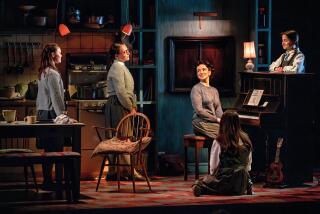A crime thriller written by a younger self, embraced by the older for new reasons
- Share via
Twenty-eight years.
If that refers to the length of a human life, it is a short time. If, however, it refers to the life of a Hollywood script from page to screen, it’s impossibly long. I wrote “The Little Things” toward the end of 1992, I believe.
I say believe, because I have no emails referencing it and no phone history to pull up on my cell, as this technology wasn’t yet available. What I do have is a hard copy of the screenplay with a WGA registration date in the spring of 1993.
Decades later I forced myself to dig it out, open it and begin to read. I’d been putting it off for a long, long time, as I was afraid the script wouldn’t be good, would be too proudly clever or that it would read like it was written by a young, not completely untalented writer, which it was.
Rereading your work after so long a time is a little like opening a high school yearbook. You look at your picture and see both fear and promise in your own young face. As I read, I had memory flashes of my crappy Hollywood apartment; House of Pies in Los Feliz, which was my writing “office”; and the garish but almost beautiful neon colors that pierced the dirty, dark streets at night. This was Hollywood before flophouses became Whole Foods grocers.
But I wasn’t just reading for pleasure or to revisit my early Hollywood years. I was reading the script to see if I wanted to direct it. Was it worth doing?
The person who pushed me to read it was Mark Johnson, although he had assists from Scott Frank and Brian Helgeland, who both really liked the script. Mark was the producer from the start, and after several almost attachments over the years from directors — Spielberg, Eastwood, Beatty, DeVito, Dean Parisot — he felt it should finally be made and that I should direct it.
Seems like an easy decision, right?
But it wasn’t. I remember, before I was directing, sending scripts to directors, confident they would say yes and the cameras would roll in a few months. When they replied, “I really liked it, but it’s not where my head is right now,” I couldn’t for the life of me understand why someone would turn down something good. It seemed like a cop-out. Maybe they just hated the scripts, I figured.
But now, having directed several films, I completely understand their response. “Where is my head right now?” I’d made excuses to not direct “The Little Things” for a long time, since 2000, when I directed my first studio feature. Back then, I’d rejected it because my children were young and I wasn’t sure I’d be my fatherly best self if I dove into the dark, deep end of this particular pool for two years. But now with my children off at college, that excuse wouldn’t fly anymore.
When I finished reading the script, I was surprised at how much I still liked it. Yes, there was too much crime scene explanation (I wrote it before “CSI” and other crime shows educated us all on a weekly basis regarding forensics), but that stuff would fall right out, and the script would be better for it. Some of the dialogue needed polishing, but not as much as I’d anticipated.
I liked it, but I didn’t immediately say yes. I needed to know, for myself, what the film was really about. Why had I written it all those years back? Certain themes/ideas were obvious from the script — obsession, compulsion, redemption, as well as a hint of Christian allegory — but what did that mean to me now?
I thought perhaps if I could recall why I was compelled to write it in the first place, my younger desires would congeal with “where my head is right now.” All I could remember was that I loved 1970s films with complicated characters and a lack of formulaic resolution. I also enjoyed crime drama and psychological thrillers but had begun to think that those genres had become too paint-by-numbers.
The first two acts would be full of complications and misdirects that were engaging, but then came the third act, where the “bad guy” is identified and the “good guy” chases him down, usually involving a needless action set-piece, and then the hero dispatches the villain in some gruesome but heroic way.
But can you both embrace and subvert a genre in a way that is non-formulaic yet satisfying? I thought this was a challenge worth taking on. After a lot of considering, I eventually discovered, through the characters, what the movie was really about for me — and me alone — understanding that an audience and even my younger self might have different answers.
And I’m OK with that. Even happy about it. I’m also happy that Mark Johnson can stop bugging me to read it.
More to Read
From the Oscars to the Emmys.
Get the Envelope newsletter for exclusive awards season coverage, behind-the-scenes stories from the Envelope podcast and columnist Glenn Whipp’s must-read analysis.
You may occasionally receive promotional content from the Los Angeles Times.










